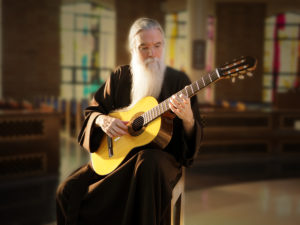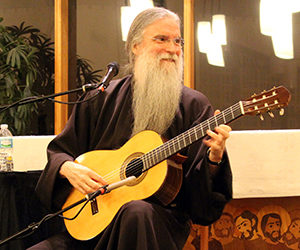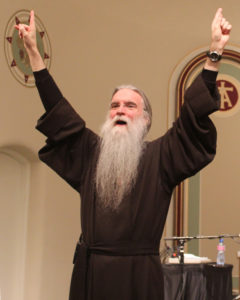John Michael Talbot is a multi-platinum selling pioneer in contemporary Christian music who is currently recording his 55th album. He is also the author of 29 books, a television host, and the Founder and General Minister of a monastic religious community, The Brothers and Sisters of Charity. Talbot’s most recent book, Monk Dynasty, was published in February 2016.
Born in Oklahoma, Talbot dropped out of school at 15 to become a guitarist in the country-folk-rock band Mason Proffit with his brother Terry. He eventually embarked on a solo music career and, after dabbling in many world religions, converted to Catholicism in 1978 and also became a Third Order Franciscan. Moving to Berryville, Arkansas, Talbot established the Little Portion Hermitage on land purchased during his Mason Profitt days. In 1980, he founded the Brothers and Sisters of Charity under the formal approval of his local bishop.
Talbot’s popular television show, “All Things Are Possible,” is produced by the Trinity Broadcasting Network for its cable affiliate The Church Channel. Talbot is also a frequent guest on faith networks around the world.
His artistic and humanitarian efforts have been recognized with awards from the National Academy of Recording Arts and Sciences, the Gospel Music Association, Mercy Corps and the Mother Teresa Award.
Today, John Michael Talbot travels the world, inspiring and renewing the faith of Christians of all denominations through sacred music and inspired teaching. In April, he took time out of his busy schedule to have a chat with Kolbe Times about his life, his faith and his mission.
Kolbe Times: Who were your sources of wisdom in the early years of your life?
John Michael Talbot: It would be folk musicians, specifically Peter, Paul and Mary; the Chad Mitchell Trio; the New Christy Minstrels; Pete Seeger; and then later Bob Dylan. What I liked was that their music wasn’t just fun – it was also saying something that had some social significance. In hindsight, I don’t know if that social significance was always a good thing, but at least they were trying to do a good thing.
Also, for my brother Terry and my sister Tanni, our parents were incredibly supportive. We attended a Methodist church, but our parents didn’t force us to go every week. We went two or three times a month, and at the same time my parents really encouraged us to think outside the box…and we did.
Kolbe Times: As you were recording and touring with Mason Proffit in the 70’s, you embarked on a spiritual search. Tell us about that time in your life.
John Michael Talbot: In my travels, I started reading about different religions in the world – Daoism and Confucianism in China, Buddhism and what we would call Hinduism from India, and also the Sufi and Kabbalah mystical traditions from the Muslim and Jewish faiths. I also really liked reading the Greek philosophers. I was so attracted to all these things I was reading – it was great.
But I also was reading from a little Revised Standard Bible that my grandmother had given me, and Jesus seemed to be saying so much more. To make a long story short, the others were all pointing to the way, the truth and the life, and they did it beautifully…but it became clear to me that Jesus is the way, the truth and the life, and in Jesus it was all so much simpler, deeper and higher.
St. Francis of Assisi and Thomas Merton also became important early “wisdom” sources for me. I came to understand that wisdom is an apparent contradiction that speaks a deeper truth. Christian wisdom is always the paschal mystery – and Jesus is the paradox of paradoxes. Christian wisdom isn’t only philosophical or theological wisdom. It’s always based on the mystical experience of the paradox. St. Paul condemns the wisdom of the Greeks, and says that the wisdom of the cross is greater than the folly of human wisdom.
But we can go out into the world and speak from a strong Christian perspective and be complementary to those of other faiths, to the Muslim, the Jew, the Buddhist, the Daoist. To speak of Jesus Christ using the “fulfillment” model can get a little self-righteous…instead I’ve come to believe that Christ complements and completes, without any self-righteousness. Wisdom is incarnate in Christ, and is completed in the cross and in His resurrection. It’s an action, not an argument. And you know, I think that syncretism, the blending of religious beliefs, is an unhelpful pattern that sometimes crops up in ecumenical dialogue. I really think it should be avoided, because it essentially disrespects the uniqueness of any tradition that is involved in the dialogue. It wants to say that their uniqueness doesn’t matter, because we’re all just going to merge and become this macaroni and cheese melt-down.
Kolbe Times: Music seems to have its own deep wisdom as well. You have spoken about how you often look up and see people weeping when you sing some of your songs.
John Michael Talbot: Yes, it’s true. When I sing my songs like Holy is His Name; Here I am, Lord; Be Not Afraid – that often happens. Music has the capability to be sacramental, to cross over into mystery. That mystery is what reaches out and touches people and takes them back to that place of their conversion, in a way beyond anything a musician can fathom. I sing these little songs, and amazing things happen. I just say, “Wow, look at that. God, you’re pretty cool.”
Kolbe Times: In many of your books (The Ancient Path; The Way of the Mystics; The Lessons of St. Francis; The World is my Cloister; Monk Dynasty), and in your modern monastic community, you seem to be bringing the wisdom of ancient ways into our times.
John Michael Talbot: Yes, I tend to lose interest in Catholic history after about the first 1500 years, right around the Reformation and the Counter-Reformation! I kind of go, “Aw, c’mon guys…can’t you get it together?” I’m a great lover of the patristic era, of the monastic reform era, and then the new communities in the revivals of the Mendicant Orders in the 13th and 14th centuries, even the Orthodox synthesis on Mount Athos in the 14th and 15th centuries – that’s the stuff I love. That’s what fires my life in Christ. I personally weep a little for the lack of rootedness I see in the North American expression of Christian faith these days. I grieve that it can seem so superficial. While I see many of the mega-churches doing a lot of things right , reaching out to young people in great ways, touching the average North American right where they live in their preaching and style of music – and I rejoice in that, and I think we Catholics have a lot to learn in those areas – but I worry that it can be too shallow, lacking in the ancient apostolic roots that give us deeper growth in our faith.
Kolbe Times: Tell us about the community you founded in Arkansas, the Brothers and Sisters of Charity at the Little Portion Hermitage.
John Michael Talbot: We are one community with many different expressions. We have one rule and constitution, and one general counsel where each expression of the community is represented. We keep the monastic expression as the base and core, but the domestic communities are an important part of it as well.
Our Little Portion Hermitage is an integrated monastic community, with celibate brothers and sisters, singles and families, rediscovering the ancient roots of communal monastic life. We share common work and recreation areas, while keeping separate cloistered areas for each expression. In our domestic communities out in the world, members live in their own homes or a House of Prayer, and either cannot or do not feel called to be in the Monastic expression. There are different ways to live out that domestic life – some people meet as seldom as once a month or so, some are coming together more frequently in cell groups, some are meeting electronically, where they meet once a week and see each other on their screens. In Chicago and in Texas we have cluster communities, where a group of people live close to one another for the purpose of frequent prayer and shared lives.
Kolbe Times: It seems there is a renewed interest in reaching back into this ancient grounding and learning more about the early traditions of our faith. So many people, especially young people, are searching for more meaning in life. Has that been your experience?
John Michael Talbot: Yes, I’m certainly seeing that, too. I was recently part of a youth conference in Evansville, Indiana, with the Franciscan Friars of the Renewal and singer Kara Klein and lots of great speakers, and it was really a good time of music and sharing the Word of God together. But I noticed that the high point for many of the kids who were there was the time of silent adoration before the Blessed Sacrament. People are rediscovering these practices from our faith tradition, which become very important to them.
I’m a conservative. I believe in conserving the rich deposit of faith that has been handed on to us. But I also believe in bringing that to our culture, to our world, in a way that is relevant and engaging. Whether that’s an ancient expression, like chant, or something more contemporary, we need to do whatever it takes to spread the Gospel message and bring new life and animation to our parishes and our faith communities. We need to get people excited about what God is doing, and that’s going to spark a renewal in family life, and a renewal in religious life in North America. Faith fires up faith.
Kolbe Times: When a fire in 2008 destroyed much of your monastery, which was later rebuilt, you gained a new vision for your ministry.
John Michael Talbot: Yes, that experience led me back into parish ministry, and we’ve been doing it ever since 2008, the year of the fire. In the last eight years since the fire, we have crisscrossed this country multiple times, to urban and rural parishes, multi-cultural ones, rich parishes and poor ones. I will be the first to tell you that it’s exhausting. But it’s given me an awareness of the crisis of the Catholic Church in the U.S., where there are around 30 million non-practicing Catholics. Pope Francis has given us the answer, in his invitation to every Christian to a renewed personal encounter with Jesus Christ. I always joke that he sounds more like a Baptist than a Jesuit! But that’s the answer – a true, ongoing engagement with Jesus Christ. We have to fire up our liturgies, and have better music and singing, and better preaching, too. I tell priests and deacons and bishops to share their faith, not just share information.
2008, the year of the fire. In the last eight years since the fire, we have crisscrossed this country multiple times, to urban and rural parishes, multi-cultural ones, rich parishes and poor ones. I will be the first to tell you that it’s exhausting. But it’s given me an awareness of the crisis of the Catholic Church in the U.S., where there are around 30 million non-practicing Catholics. Pope Francis has given us the answer, in his invitation to every Christian to a renewed personal encounter with Jesus Christ. I always joke that he sounds more like a Baptist than a Jesuit! But that’s the answer – a true, ongoing engagement with Jesus Christ. We have to fire up our liturgies, and have better music and singing, and better preaching, too. I tell priests and deacons and bishops to share their faith, not just share information.
People tell me that they don’t want “entertainment” in church, and that’s a good point. But we do need engagement. Engagement is focused on Jesus – entertainment is focused on a preacher or a musician. I understand that we don’t just want emotional-ism. It rises and falls far too easily. But we do want enthusiasm! The word enthusiasm comes from the ancient Greek words en theos, which means “in God”. That’s what we want, and that’s what we need, if we don’t want to lose all our young people.
When we strip things back to the basics of our faith that the early church practiced, when Christians met in each others’ homes, we will rediscover our power, and reach out and grow and evangelize the world again. But we need to step out of our boat. It’s scary to walk on water. I know that. It’s scary to get out of your comfort zone. The trouble is that we want to want revival, but we don’t actually want revival. Or at least we want somebody else to do it.
To actually want revival means I will have to change, in my personal life first and then in my church or parish. People say, “But we’ve always done it this way at our parish!” Then I put on my Dr. Phil hat and say, “Yeah, and how’s that working for ya?” But if you gather up your courage, step out of your boat and enter into that encounter with Christ, I guarantee your life will never be the same. We Catholics have never really understood this “personal relationship with Jesus” stuff; we just want to be “religious”. But, darn it, get out of your boat! It’s what we’re all called to do – walk on water! And that takes faith.
Faith is the substance, the personification of things hoped for, things not yet seen. Faith is the hupostasis in Greek, which means person. So when you really want revival, you’re personifying in the present moment the stuff that you hope for in the future. When you want revival, you’re willing to personify it right now, in your family, in your parish, in your church community. You walk by faith and not by sight. You stand up and take action. You don’t wait.
We have such a full and wonderful potential as Christians, which is both ancient and new. It’s rooted and yet it reaches high. It’s apostolic and it’s also contemporary. The Greek word for us is Christianos, which means those who are “in the company of Christ”. Each of us can be fully anointed and fully empowered to bring something unique that no one else can bring, if we will but have the courage and faith to do it.
Kolbe Times: Thanks so much for sharing your story and your insights with us today. It’s been great talking to you.
John Michael Talbot: It’s been really wonderful talking with you, too. May God bless you and your readers!
All photos courtesy of John Michael Talbot.
Visit www.JohnMichaelTalbot.com and “like” his Facebook page to enjoy his daily Gospel Reflections.
A video visit to Little Portion Hermitage, with music by John Michael Talbot:










Awsome ,well informed answers to great questions !
May your tradition & way of spreading the Good News be passed on to other generations JMT! ☘
Happy Mothers Day to all mothers❤️Living & deceased
Plsase put me on ur email..over 30 yrs i have been blessed bro..micheal by the scripture songs u have wriiten..thk u
As well as the brother to brother cd
With micheal card..again thk u.in.
Jesus Christ our lord and savior
Yes, Brother John Michael has been a blessing to many! And we’re happy to put you on our Kolbe Times newsletter email list.
What a great interview and video brought back such wonderful memories for me at the hermitage. Thankyou JMT
JMT helped me through troubled times after a failed project in the Philippines – a great part of my meditations…thanks